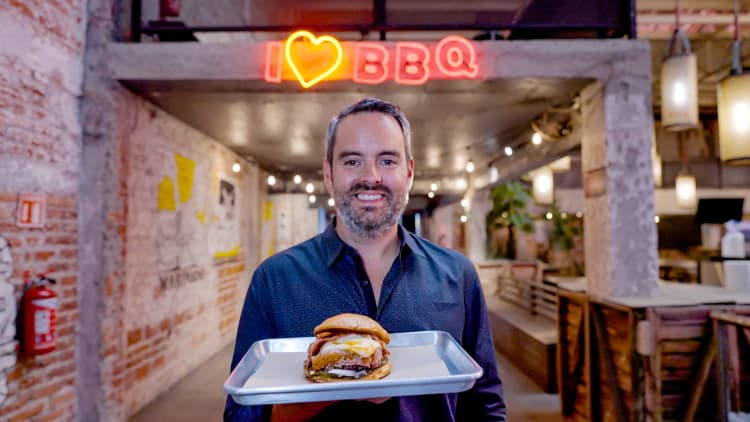To Steven Schwartz, the side hustle was a necessity: He wanted rare Nike Kobe 7 Easter shoes, and his parents wouldn't pay for them.
The then-13-year-old took over his family's only computer, and spent hours learning to build sneaker bots — software that snaps up limited-edition shoes faster than a human ever could. In a Facebook group dedicated to the subject, he met Cameron Zoub, a fellow middle schooler and Chicagoan. They quickly became friends and business partners, selling their bots under the name Sole Sniper.
Now in their mid-20s, Schwartz and Zoub still work together, along with a third partner named Jack Sharkey. They're the co-founders of Whop, a tech marketplace that's like "Etsy for software products," Schwartz says.
Whop isn't the first platform where people buy and sell programs, but it might be among the most successful: Since launching in March 2021, it has facilitated up to $11.8 million per month in software sales, according to documents reviewed by CNBC Make It.
The company takes between 3% and 4.5% plus 40 cents of most transactions, and 30% of transactions made by featured sellers, Whop's website notes. That indicates a monthly revenue of at least $354,000, or more than $4.25 million per year, according to calculations by Make It. (Whop reviewed the estimate, but declined to offer specifics.)
Last month, the company announced a $17 million Series A funding round, with investors ranging from hedge fund titan Peter Thiel to athletes and musicians like James Harden and The Chainsmokers.
"When we were growing up, people thought we were weird to be trying to do something entrepreneurial," Schwartz, 25, says. "It wasn't the status quo, especially not software businesses. We are now building a platform for the 15-year-old versions of ourselves."
But Whop wasn't an overnight success. It wasn't the founders' first attempt at taking their entrepreneurship full-time, either.
Building bots and business blocks
When Schwartz and Zoub started Sole Sniper, their parents joked they were selling drugs: It was their only explanation for two teenagers actually making money by spending all day on the computer.
Instead, the kids built and sold sneaker bots for anywhere from $20 to $500 each, Schwartz says. Zoub bought a Tesla Model S with the earnings, and eventually dropped out of high school to pursue full-time software work, Schwartz says.
Schwartz went to New York University, and spent the summer after his freshman year working in Singapore for Fortune 500 consulting company Accenture. There, he saw people paying significant amounts of money — more than he or Zoub had ever made together — for IT help, a skill he considered well within his wheelhouse.
He reached out to Zoub, and they decided to start an IT agency in late 2018. They hired Sharkey, who Zoub met during high school, as the company's first developer. The agency offered "much more consistent income" than sneaker bots, Schwartz says. "At our peak, I think we brought in like $100,000 per month [in revenue]."
Seeking creativity and a challenge
The cash was nice, but completing projects for exacting clients felt transactional, and wasn't creativity fulfilling for three 20-somethings who loved creating software, says Schwartz.
Schwartz estimates he and Zoub created more than 20 companies together, and another three with Sharkey, but they mostly fell flat. They'd abandon projects if they made mistakes, got bored, or if the ventures didn't show signs of long-term success.
In December 2020, when Schwartz was a college senior, a mutual friend showed the trio a forum where users were selling and buying software — not unlike the sneaker bots Schwartz and Zoub wrote as teenagers.
Zoub tried his hand at selling on the site, and thought it was poorly designed — no one knew how to price their services and users were getting scammed. He pitched his co-founders, who already knew how to write software and attract customers: Let's take what's good about this "makeshift marketplace," and make it better.
The trio launched Whop that March. When it didn't gain immediate traction, Schwartz's confidence wavered. He was about to graduate college and would need sustainable income.
Zoub convinced him to stick it out, saying Whop just needed time to catch traction. He was right: After three months, the platform gained a foothold on Twitter, with social media users hailing it as more secure than its competitors, Schwartz says.
'Don't sell this. Don't be stupid'
Four months in, the trio got their first acquisition offer. Unsure how to proceed, they reached out to an early-stage angel investor named Cory Levy, who ran a startup accelerator called Z Fellows for which they'd previously applied.
Levy, sensing potential, put them in touch with Tinder co-founder Justin Mateen. As Schwartz recalls, Mateen told them, "Don't sell this. Don't be stupid."
Instead, the three 20-somethings decided — for the first time — to seek external funding, so they could hold onto the platform's momentum. Mateen connected them to investors like Thiel, eventually leading to their $17 million fundraising round.
Once they had the cash, they directed it toward infrastructure. Whop currently employs 25 people, hosts about 3,000 sellers and has facilitated more than two million purchases since launching, according to the company.
As long as the trio of co-founders can maintain that trajectory, it's a win-win: There's little chance they'll feel creatively stunted again anytime soon, because whenever they create a side project, they can sell it on their own platform.
"The beauty of Whop is if we have an idea, we can just go on Whop and try it out," Schwartz says. "It's a really amazing way to use your own product."
DON'T MISS: Want to be smarter and more successful with your money, work & life? Sign up for our new newsletter!
Get CNBC's free Warren Buffett Guide to Investing, which distills the billionaire's No. 1 best piece of advice for regular investors, do's and don'ts, and three key investing principles into a clear and simple guidebook.






